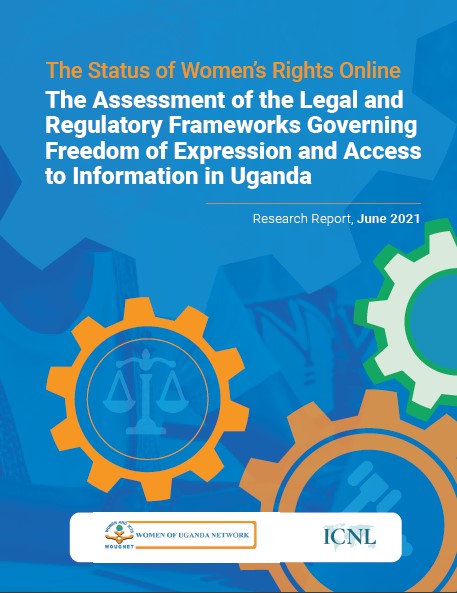- Version
- Download 140
- File Size 524.75 KB
- File Count 1
- Create Date June 9, 2021
- Last Updated May 7, 2023
The Assessment of the Legal and Regulatory Frameworks Governing Freedom of Expression and Access to Information in Uganda
The Internet and other digital technologies such as social media...
The Internet and other digital technologies such as social media have been considered the most disruptive information and communication technologies (ICT) that have transformed the free flow of information by offering anyone with an Internet connection, the ability to gather and disseminate news, information, and opinions.
At the end of September 2020, total internet subscriptions had for the first time in industry history crossed the 20 million mark. This translates into an internet connection for 1 in every 2 Ugandans.
Despite the increase in access to and use of the internet and ICTs across the board, access and affordability is still a challenge for large sections of the population especially the poor, rural populations, women, and persons with disabilities.
According to a 2015 Uganda Communications Commission (UCC) survey on Access and Usage of ICTs, only 44% of women owned and could use a phone at any time compared to 62% of the men. Additionally, only 15% of women had used a computer or the internet in the last three months prior to the survey compared to 21% of the men that were interviewed.
According to a 2018 National Information and Technology-Uganda (NITA-U) study on ICT, there is a location bias with more urban individuals owning mobile phones compared to rural counterparts (78.5% vs 65.7% respectively) and a gender bias with more males owning mobile phones compared to females (81.6% vs. 63.2%).
The gender gap in internet access is perpetuated by several factors including limited access to the internet, lack of digital skills and empowerment of women, lack of affordability of ICT services especially broadband connectivity, relevant content as well as safety of women online.
According to the 2020 report from the UCC, the cost of acquiring 1 gigabyte of the internet in Uganda stands at $2.67(Shs9819). Compared to Kenya, Tanzania, and Rwanda at $2.41(Shs8863), $2.18(Shs8017), and $2.18(Shs8017) respectively, Uganda’s is the highest.
However, beyond having access to and affording the costs of the internet, utilization of these digital technologies requires the right skills, knowledge, and tools. Unfortunately, the majority of women also lack the skills and confidence to engage with digital technologies effectively at every level, starting from basic usage. In Uganda, there are high illiteracy levels among women, which impedes their access to and use of digital technologies.
2014 shows that literacy levels among females were lower at, 68% compared to that of males, which stood at 77%.7. If the digital gender gap is not addressed, digital technologies may exacerbate gender inequalities rather than help to reduce them, and girls and women will not be able to equally participate in the more increasing digital spaces.

